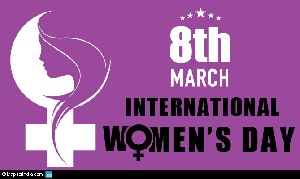 International Women's Day is on March 8
International Women's Day is on March 8
By: Alex Blege
It’s estimated that women account for 70 per cent of the world’s working hours, yet earn 10 per cent of the world’s income; consequently, there’s total gender inequality at the labour front globally. According to the International Labour Organisation (ILO), gender equality hinges on four conventions – equal remuneration, non-discrimination, workers with family responsibilities and maternity protection.
Globally, March 8 each year is dedicated to the celebration of women. This year’s theme, “Women in the changing world of work: Planet 50:50 by 2030”. In her message, Phumzile Mlambo-Ngcuka, UN Women Executive Director, stated: “achieving equality in the workplace will require an expansion of decent work and employment opportunities, involving governments’ targeted efforts to promote women’s participation in economic life, the support of important collectives like trade unions and the voices of women themselves in framing solutions to overcome current barriers to women’s participation”.
The provision of decent work for women in the changing world of work and recognition of their contribution leads to the achievement of the following: reduction of poverty and its consequences, such as child labour; inequalities among the citizenry within and among countries; gender equality for all and the inclusive and sustainable economic growth, full and productive employment and decent work for all.
Goals 1, 5, 8 and 10 of the Sustainable Development Goals capture the above succinctly: end poverty in all its forms everywhere; achieve gender equality and empower all women and girls; promote sustained, inclusive and sustainable economic growth, full and productive employment and decent work for all; and, reduce inequality within and among countries.
Gender experts argue that women empowerment and by extension gender equality can be achieved at three levels: when unequal power relations are transferred and women gain greater equality with men; at the government level, women’s empowerment would include the extension of all fundamental, social, economic and political rights to women; and, finally, at the individual level it’s the process by which women gain inner power to express and defend their rights, gain greater self-esteem and control over their own lives in personal and social relationships.
Thus, gender equality must be targeted at three levels – transfer of unequal power relations, extending fundamental, social, economic and political rights to women in the changing world of work: private, public and informal sectors; and, building the capacity of girls and women to gain greater self-esteem.
Locally, the day focuses on rural women with a theme: “Economic empowerment of rural women: a tool for sustainable development in a changing world of work”. In launching the day, Ms Otiko Djaba, the Minister for Gender, Children and Social Protection stated: “the theme was chosen to challenge the negative traditional and socio-cultural practices, call for gender-balanced leadership, value every woman and man’s contribution equally and create inclusive and flexible cultures in line with the focus of the international community”.
One of the ways of empowering women to overcome the myriad of challenges is through literacy. The Brazilian educator and philosopher, Paulo Freire argues: “education can be functional, like an instrument used to facilitate conformity, or can become a process of developing freedom, where men and women deal critically and creatively with reality and discover how to participate in the transformation of their world”
Literacy is at the core of economic empowerment of the Ghanaian rural woman. Literacy is a tool for access to greater awareness, information, knowledge, skills, understanding and power, for multiple purposes. Economic empowerment can be achieved when the Ghanaian rural woman possesses adequate literacy.
There can’t be a total economic empowerment when the literacy rate among rural women is nothing to write home about. In a 2013 report of the Food and Agricultural Organisation, Gender Inequalities in Rural Employment in Ghana: An Overview, “in rural areas only 29 percent of women are literate compared to 52 percent of men”.
Obviously, this will hinder the achievement of economic empowerment of rural women and, by and large gender equality in all aspects of the lives of rural women.
The writer is a freelance journalist.
kw.ameblege@hotmail.com/kwameblege12@hotmail.com